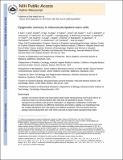| dc.contributor.author | Kim, K. | |
| dc.contributor.author | Doi, A. | |
| dc.contributor.author | Wen, B. | |
| dc.contributor.author | Ng, K. | |
| dc.contributor.author | Zhao, R. | |
| dc.contributor.author | Cahan, Patrick | |
| dc.contributor.author | Kim, J. | |
| dc.contributor.author | Aryee, M. J. | |
| dc.contributor.author | Ji, H. | |
| dc.contributor.author | Ehrlich, L. I. R. | |
| dc.contributor.author | Yabuuchi, A. | |
| dc.contributor.author | Takeuchi, A. | |
| dc.contributor.author | Cunniff, K. C. | |
| dc.contributor.author | Hongguang, H. | |
| dc.contributor.author | Mckinney-Freeman, S. | |
| dc.contributor.author | Naveiras, O. | |
| dc.contributor.author | Yoon, T. J. | |
| dc.contributor.author | Irizarry, Rafael A. | |
| dc.contributor.author | Jung, N. | |
| dc.contributor.author | Seita, J. | |
| dc.contributor.author | Hanna, Jacob | |
| dc.contributor.author | Murakami, P. | |
| dc.contributor.author | Jaenisch, Rudolf | |
| dc.contributor.author | Weissleder, R. | |
| dc.contributor.author | Orkin, Stuart H. | |
| dc.date.accessioned | 2012-10-12T18:17:07Z | |
| dc.date.available | 2012-10-12T18:17:07Z | |
| dc.date.issued | 2010-07 | |
| dc.date.submitted | 2010-02 | |
| dc.identifier.issn | 0028-0836 | |
| dc.identifier.issn | 1476-4687 | |
| dc.identifier.uri | http://hdl.handle.net/1721.1/73941 | |
| dc.description.abstract | Somatic cell nuclear transfer and transcription-factor-based reprogramming revert adult cells to an embryonic state, and yield pluripotent stem cells that can generate all tissues. Through different mechanisms and kinetics, these two reprogramming methods reset genomic methylation, an epigenetic modification of DNA that influences gene expression, leading us to hypothesize that the resulting pluripotent stem cells might have different properties. Here we observe that low-passage induced pluripotent stem cells (iPSCs) derived by factor-based reprogramming of adult murine tissues harbour residual DNA methylation signatures characteristic of their somatic tissue of origin, which favours their differentiation along lineages related to the donor cell, while restricting alternative cell fates. Such an ‘epigenetic memory’ of the donor tissue could be reset by differentiation and serial reprogramming, or by treatment of iPSCs with chromatin-modifying drugs. In contrast, the differentiation and methylation of nuclear-transfer-derived pluripotent stem cells were more similar to classical embryonic stem cells than were iPSCs. Our data indicate that nuclear transfer is more effective at establishing the ground state of pluripotency than factor-based reprogramming, which can leave an epigenetic memory of the tissue of origin that may influence efforts at directed differentiation for applications in disease modelling or treatment. | en_US |
| dc.description.sponsorship | National Institutes of Health (U.S.) (NIH grant RO1-DK70055) | en_US |
| dc.description.sponsorship | National Institutes of Health (U.S.) (NIH Grant RO1-DK59279) | en_US |
| dc.description.sponsorship | National Institutes of Health (U.S.) (American Recovery and Reinvestment Act (RC2-HL102815)) | en_US |
| dc.description.sponsorship | National Institutes of Health (U.S.) (NIH (K99HL093212-01)) | en_US |
| dc.description.sponsorship | Cooley’s Anemia Foundation | en_US |
| dc.description.sponsorship | National Institutes of Health (U.S.) (NIH LLS (3567-07)) | en_US |
| dc.description.sponsorship | National Institutes of Health (U.S.) (NIH grant R37CA054358) | en_US |
| dc.description.sponsorship | National Institutes of Health (U.S.) (NIH grant P50HG003233) | en_US |
| dc.description.sponsorship | National Institutes of Health (U.S.) (NIH grant R01AI047457) | en_US |
| dc.description.sponsorship | National Institutes of Health (U.S.) (NIH Grant R01AI047458) | en_US |
| dc.description.sponsorship | National Institutes of Health (U.S.) (CA86065) | en_US |
| dc.description.sponsorship | National Institutes of Health (U.S.) (HL099999) | en_US |
| dc.description.sponsorship | Thomas and Stacey Siebel Foundation | en_US |
| dc.description.sponsorship | California Institute for Regenerative Medicine (Fellowship T1-00001) | en_US |
| dc.language.iso | en_US | |
| dc.publisher | Nature Publishing Group | en_US |
| dc.relation.isversionof | http://dx.doi.org/10.1038/nature09342 | en_US |
| dc.rights | Creative Commons Attribution-Noncommercial-Share Alike 3.0 | en_US |
| dc.rights.uri | http://creativecommons.org/licenses/by-nc-sa/3.0/ | en_US |
| dc.source | PMC | en_US |
| dc.title | Epigenetic memory in induced pluripotent stem cells | en_US |
| dc.type | Article | en_US |
| dc.identifier.citation | Kim, K. et al. “Epigenetic Memory in Induced Pluripotent Stem Cells.” Nature 467.7313 (2010): 285–290. Web. | en_US |
| dc.contributor.department | Massachusetts Institute of Technology. Department of Biology | en_US |
| dc.contributor.department | Whitehead Institute for Biomedical Research | en_US |
| dc.contributor.mitauthor | Hanna, Jacob | |
| dc.contributor.mitauthor | Jaenisch, Rudolf | |
| dc.relation.journal | Nature | en_US |
| dc.eprint.version | Author's final manuscript | en_US |
| dc.type.uri | http://purl.org/eprint/type/JournalArticle | en_US |
| eprint.status | http://purl.org/eprint/status/PeerReviewed | en_US |
| dspace.orderedauthors | Kim, K.; Doi, A.; Wen, B.; Ng, K.; Zhao, R.; Cahan, P.; Kim, J.; Aryee, M. J.; Ji, H.; Ehrlich, L. I. R.; Yabuuchi, A.; Takeuchi, A.; Cunniff, K. C.; Hongguang, H.; Mckinney-Freeman, S.; Naveiras, O.; Yoon, T. J.; Irizarry, R. A.; Jung, N.; Seita, J.; Hanna, J.; Murakami, P.; Jaenisch, R.; Weissleder, R.; Orkin, S. H.; Weissman, I. L.; Feinberg, A. P.; Daley, G. Q. | en |
| mit.license | OPEN_ACCESS_POLICY | en_US |
| mit.metadata.status | Complete | |
